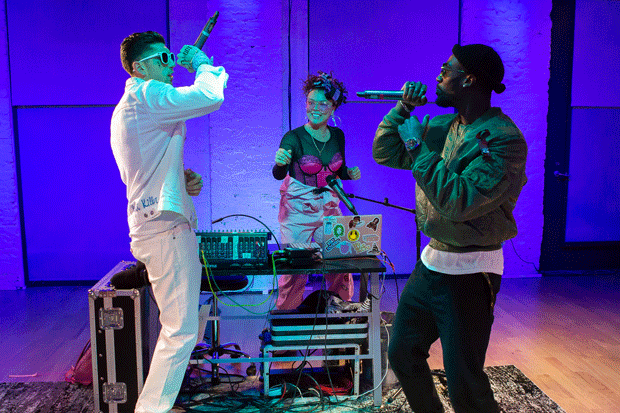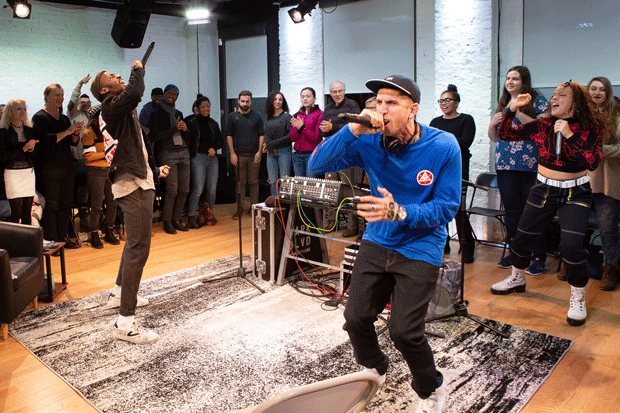Friendship and Race Collide in Hype Man: A Break Beat Play

(© Hunter Canning)
Some plays ask us to reflect on an issue; others call on us to act. Idris Goodwin's hip-hop play Hype Man: A Break Beat Play falls into the latter camp. The specific issue it addresses revolves around the violence that people of color, men in particular, have experienced at the hands of law enforcement. But the play, now running at the Flea Theater, also addresses broader issues, joining a number of other works seen on New York stages this season that deal with racism and the crisis of communication between blacks and whites in addressing it, including Jackie Sibblies Drury's Fairview and Christopher Demos-Brown's American Son. Hype Man takes on this chronic problem and smartly examines it through the lens of hip-hop.
The story involves a group of three young rappers on the cusp of greatness: white front man Pinnacle, mixed-race beat maker (her exact background is never revealed) Peep One, and black, aptly named hype man Verb. Pinnacle and Verb grew up together in the inner city, and now the trio, decked in sweats, jewelry, and copious tattoos (costumes by Sarah Lawrence), is about to hit it big with a spot on the Tonight Show when news of a fatal shooting of an innocent black man by police blurs the group's focus.
Pinnacle, who has a cop in his family, mourns the tragedy but thinks the group should stay the course. Verb, however, has had it with cops shooting black men; it's time for the three of them to publicly voice their outrage. Without the others' knowledge, he publicly wears an provocative shirt during their TV spot to protest the shooting, and the negative backlash is swift. Peep finds herself caught between competing loyalties as Pinnacle's and Verb's previously unspoken views on race threaten to destroy not just their shot at success but also their friendship.

(© Hunter Canning)
Goodwin's script, though not an entirely airtight 75 minutes, goes a long way in describing the challenges white and black people face when having conversations about race. Though Pinnacle (played by a swaggering, confident Matt Stango) has grown up with people of color all his life, the experience of living in white skin still separates him from Verb (fiercely intelligent performance by Shakur Tolliver). "You can walk outta here and never think about race again," says Peep One (a dynamic Tay Bass), the most complex of the three characters. She's a woman who's carving out her own space in the sometimes misogynistic world of hip-hop but can see both sides of the racial dilemma. How can progress be made when friends with similar backgrounds can't figure things out? The first step, the play implies, is lowering the volume and listening.
Directors Kristan Seemel and Niegel Smith (the latter is the Flea's artistic director) breeze over some of the gaps in the script; the characters' shifting allegiances and quickly resolved quarrels feel too pat to be believed. But several heart-pounding musical performances, augmented by Xavier Pierce's colorful concert lighting and Keenan Hurley's loud but clear sound design, help us overlook the plot's shortcomings. The intimacy of the small, recording-studio-inspired theater space (set by Anton Volovsek), which puts the actors into near contact with the audience, is exactly what a play about bringing people together needs.
The phrase "hype man" refers to a backup rapper who energizes an audience by getting them to participate in a song by means of call-and-response phrases. "My favorite all time Hype Man — Bobby Byrd," says Verb. "On 'Sex Machine,' he's the guy saying 'Get on up' after James [Brown] says, 'Stay on the scene." An ideal play for talkbacks, Goodwin's Hype Man is a loud and clear clarion call for blacks and whites, cops and civilians, and everyone to get on up (spoiler: you will get up near the end of this show) and openly, honestly discuss America's ongoing problems of racial violence and inequality. None of us get to sit this one out.










